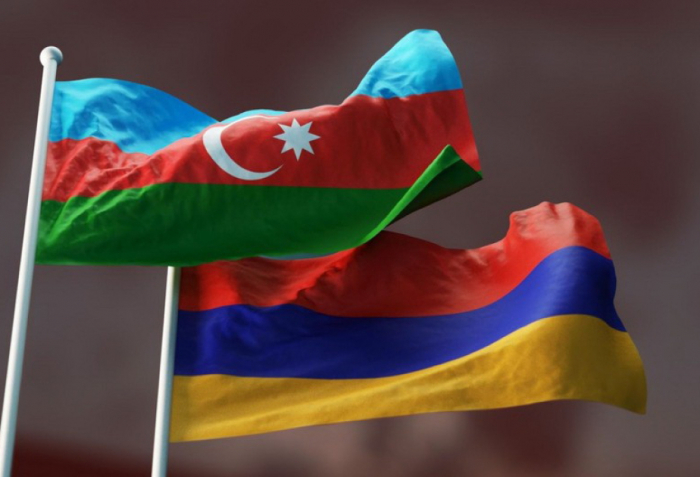The Armenia-Azerbaijan peace process began the new year with a bombshell revelation: a video recording from the first congress of the “Yerkrapah” Volunteer Union in July 1993. The footage features Armenia’s first president, Levon Ter-Petrosyan, delivering a speech on the “success” of Armenia’s “national liberation movement.” The speech, along with the reaction of Vazgen Sargsyan – leader of “Yerkrapah” and Armenia's Defense Minister in the early 1990s – holds significant political, legal, and humanitarian implications for the ongoing peace negotiations between the two countries.
First, what is “Yerkrapah”? Yerkrapah (translated as “Defender of the Land”) is an Armenian volunteer organization that was established in the early 1990s during the First Karabakh War. It was founded by veterans of the war and was initially intended to unite former combatants who fought for Armenia against Azerbaijan. Over time, Yerkrapah evolved into an informal branch of the Armenian Armed Forces, actively participating in Armenia’s occupation of Azerbaijani territories in the early 1990s and in the subsequent period. The members of Yerkrapah fought in the four-day April war in 2016 as well as in the 2020 Karabakh War. Yerkrapah is still operational. We heard its name as recently as February 2024 when members of this group attacked Azerbaijani positions at the interstate border. According to Yerkrapah’s own sources, around 8,000 volunteers from this group serve at Armenia’s borders.
Thus, it is no coincidence that Armenia’s then-president Ter-Petrosyan attended the first congress of Yerkrapah in 1993, praised the “heroism” of its members, and celebrated the “accomplishments” of the movement. His speech, however, was more than just ceremonial remarks. Although he later publicly promoted the image of a politician striving to resolve the Armenia-Azerbaijan conflict, even seemingly proposing the return of some occupied territories to Azerbaijan, his speech in this closed-door meeting revealed a starkly different persona and intentions.
In the video, Ter-Petrosyan is heard saying: “Armenia and Nagorno-Karabakh resolved a 600-year-old problem by completely cleansing the territory of other ethnicities (referring to Azerbaijanis). If there were still 170,000 representatives of other ethnicities in Armenia today, as there were until 1988, we would not have our state.” He further claimed that retaining regions such as Zangezur and others, where Azerbaijanis were the majority, would have been impossible without such measures.
In another leaked video from the congress, Vazgen Sargsyan, then the head of Yerkrapah, is heard warning that the president’s remarks should not be leaked to the media and that the video recording of this speech should never be made public due to its potential harms to Armenia’s cause. Thirty-two years later, the video has been made public, raising numerous questions about past peace negotiations and the future of the Armenia-Azerbaijan peace process.
Above all, it is now clearer that the Armenian governments had no intentions of returning any inch of the occupied territories to Azerbaijan. In the leaked video, Ter-Petrosyan is heard saying that the Armenian people “will feel the meaning [of ethnic cleansing of Armenia and Karabakh from other ethnicities] for the next 600 years.” Certainly, this vision of the future of “Armenian homelands” would never have allowed a peaceful solution to the conflict. Some political and expert groups in the West, who blame Azerbaijan for using force to de-occupy Karabakh, turn a blind eye to this fact.
Another question raised by Ter-Petrosyan’s remarks concerns the future of the peace process. Azerbaijan’s government has repeatedly stated that Armenians who voluntarily left Karabakh in 2023 can return to their homes if they apply for Azerbaijani citizenship and agree to live in accordance with Azerbaijani laws. A significant question arises as to why the Armenian government does not reciprocate by inviting Azerbaijanis, who were forcibly expelled from their homes in what is now modern-day Armenia, to return. Representatives of these Azerbaijanis have addressed the Armenian government several times, calling for dialogue, but to no avail.
While Prime Minister Nikol Pashinyan, much like his predecessor and former ally Levon Ter-Petrosyan, projects the image of a constructive peacemaker, he has never addressed the issue of Azerbaijanis deported from Armenia in the last century. This lack of reciprocity undermines trust in the peace process and raises doubts about Armenia’s true intentions in resolving the conflict.
Quite the contrary, we hear the revanchist forces in Armenia and diaspora continue to propagate their dreams of “restoring Great Armenia” and “liberating” their lost territories. For instance, on December 30, 2024, talking about the activities of Armenian diaspora, Ara Puluzian, the head of the Dashnaktsutyun Central Committee of “Artsakh,” an institution that is actively supported by the Armenian National Committee of America (ANCA), clearly stated their objectives.
“The rights of Karabakh Armenians should not only be regarded as the rights of Karabakh Armenians but also as the rights of the entire Armenian people. Armenia, together with “Artsakh,” “Javakhk,” and “Western Armenia,” constitutes the homeland of the Armenian people. The struggle for the liberation of the homeland must become the collective responsibility of everyone”, Puluzian said.
For clarification, ‘Javakhk’ refers to a region in Georgia, while ‘Western Armenia’ denotes the eastern parts of Türkiye as referenced by Puluzian. Unfortunately, peace will remain an elusive dream in the South Caucasus as long as this expansionist mindset persists.
The activities of Armenian revanchist groups, along with the revelations from the 1993 speech, underscore the deeply rooted challenges in achieving a lasting peace between Armenia and Azerbaijan. They reveal the ideological underpinnings of Armenia’s leadership during the formative years of the conflict and the extent to which these historical narratives continue to shape present-day politics. For the peace process to succeed, addressing these historical grievances and fostering genuine dialogue between the two nations is crucial. Without this, the path to reconciliation will remain fraught with distrust and uncertainty.
AzVision.az
More about: Azerbaijan Armenia
















































